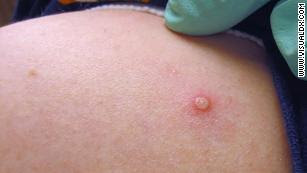Monkeypox is growing and affects all countries, it is important to know this disease, below are some elements of answers:
What is monkeypox?
Monkeypox is a disease caused by the virus of orthopoxvirus simian. It is a viral zoonosis, which means that it can be transmitted to humans by animals. It can also be transmitted from person to person.
What are the symptoms of monkeypox?
The classic symptoms of monkeypox are fever, severe headache, muscle aches, back pain, fatigue, swollen lymph nodes, and skin rash or lesions. The rash usually appears one to three days after the onset of fever. The skin lesions are usually flat or slightly raised, may contain clear or yellowish fluid, and then form a crust that dries out and eventually falls off. The number of lesions varies from a few to several thousand. The rash is usually concentrated on the face, palms and soles of the feet. Lesions may also appear on the mouth, genitals and eyes.
Symptoms usually disappear spontaneously after two to four weeks without treatment. If you have any symptoms that are suggestive of monkeypox, please see a health care provider. Let your health care provider know if you have been in close contact with a suspected or confirmed case of monkeypox.
How is monkeypox spread from person to person?
What is monkeypox?
Monkeypox is a disease caused by the virus of orthopoxvirus simian. It is a viral zoonosis, which means that it can be transmitted to humans by animals. It can also be transmitted from person to person.
What are the symptoms of monkeypox?
The classic symptoms of monkeypox are fever, severe headache, muscle aches, back pain, fatigue, swollen lymph nodes, and skin rash or lesions. The rash usually appears one to three days after the onset of fever. The skin lesions are usually flat or slightly raised, may contain clear or yellowish fluid, and then form a crust that dries out and eventually falls off. The number of lesions varies from a few to several thousand. The rash is usually concentrated on the face, palms and soles of the feet. Lesions may also appear on the mouth, genitals and eyes.
Symptoms usually disappear spontaneously after two to four weeks without treatment. If you have any symptoms that are suggestive of monkeypox, please see a health care provider. Let your health care provider know if you have been in close contact with a suspected or confirmed case of monkeypox.
How is monkeypox spread from person to person?
People with monkeypox are contagious as long as they have symptoms (usually two to four weeks). Transmission can occur through close physical contact with a person with symptoms. The rash, body fluids (such as fluid, pus, or blood from lesions), and scabs are particularly infectious. Clothing, bed linens, towels, and items such as cooking utensils and dishes that have become contaminated with the virus through contact with an infected person can also be a source of transmission.
Ulcers, sores and pimples in the mouth can also be contagious, which means that the virus can be transmitted through saliva. This puts people who are in close contact with an infectious person, including their caregivers, family members and sexual partners, at greater risk of infection.
The virus can also be transmitted from a pregnant woman to her fetus through the placenta, or from an infected parent to her child at delivery or after birth through skin-to-skin contact.
It is not known at this time whether people who do not have symptoms can transmit the disease.
How can I protect myself and others from monkeypox?
You can reduce your risk of getting monkeypox by limiting your contact with suspected or confirmed cases of the disease.
If you must come into physical contact with a person with monkeypox because you are a caregiver or live together, encourage the infected person to isolate himself or herself and, if possible, cover any skin lesions (for example, by wearing clothing over the affected areas). When you are in close contact with the person, especially if they are coughing or have mouth sores, make sure they wear a medical mask. You should also wear one. Avoid skin-to-skin contact whenever possible and use disposable gloves if you must touch lesions. Wear a mask when handling clothing or bedding if the infected person cannot do it himself.
Wash your hands regularly with soap and water or hydroalcoholic solution, especially after contact with the infected person or after touching their clothing, sheets, towels, or any other object or surface that they have touched or that may have come into contact with their sores or respiratory secretions (for example, kitchen utensils or dishes). Wash the infected person’s clothes, towels, bedding and kitchen utensils with hot water and detergent. Clean and disinfect all contaminated surfaces and dispose of contaminated waste (e.g., dressings) properly
Is monkeypox a sexually transmitted infection?
Monkeypox can be transmitted from one person to another through close physical contact, including sexual contact. It is not known at this time whether monkeypox can be transmitted sexually (for example, through semen or vaginal secretions), but it can be transmitted through direct skin-to-skin contact with lesions during sex.
Monkeypox can cause a rash on the genitals and mouth, which can contribute to the transmission of the virus during sex. The virus can be transmitted through mouth-to-skin contact if there are lesions on the mouth or skin.
The rash caused by monkeypox can resemble the rash caused by some sexually transmitted diseases, such as herpes or syphilis. This may explain why several cases have been identified recently in men attending sexual health clinics.
The risk of contracting monkeypox is not limited to sexually active people or men who have sex with men. Anyone who has close physical contact with an infectious person is at risk of contracting the disease. If you experience symptoms suggestive of monkeypox, it is imperative that you seek medical attention immediately.



Comment here